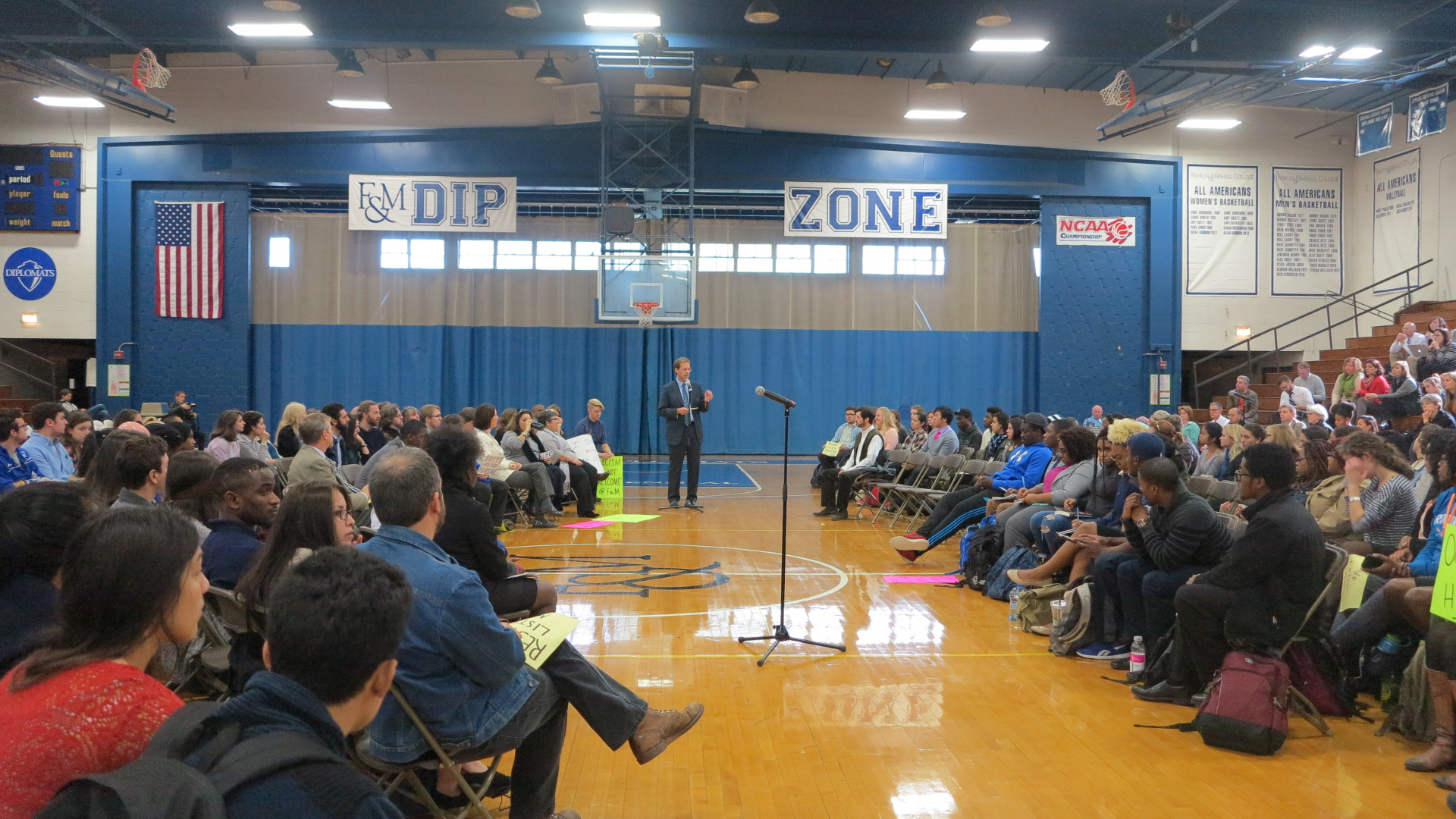By Steven Viera || Senior Editor

Dan Porterfield, president of the College, hosted a forum for students, faculty, and professional staff last Tuesday, Nov. 17. The forum was originally set to occur in the atrium of the Steinman College Center but was eventually held in Mayser Gymnasium and provided attendees— about 400 in total— the opportunity to discuss issues of race, discrimination, and harmful rhetoric on campus.
Immediately before the dialogue began, a group of students led the audience in a chant: “Hey, hey! Ho, ho! Racism has got to go!” During the chant and even after discussion commenced, a number of attendees examined a poster, entitled “Black Yak,” that featured several racist posts from the social media app Yik Yak that had been made by members of the F&M community as an example of the vitriol encountered by students of color; in fact, racially-motivated posts on Yik Yak prompted the forum in the first place.
“I helped write a letter to Dr. Porterfield detailing the sentiments that some students of color had regarding the negative statements made on Yik Yak,” said Brandon Smith ’17. “This sparked a larger discussion on campus.”
Porterfield opened the talk with an address to the audience. He spoke about the need to trust in one’s identity in order to take a leap of faith for personal growth, the impact Yik Yak comments have on students and the campus community as a whole, discussed the protests and demonstrations at the University of Missouri that served as another catalyst for the forum, and read from relevant portions of the F&M College Life Manual. He also stressed that while racist discourse may occur on campus, it does not
characterize the spirit of F&M.
“We must never allow ourselves to think that people who express opinions that marginalize and that hate are the center of our school,” he said. “You [forum attendees] are the center of our school.”
Following Porterfield, Donnell Bailey ’17, president of the Diplomatic Congress, spoke briefly. He shared a recent experience he had with a prospective student of color and referred to F&M’s history of activism and support of civil rights.
“In 1963, Dr. Martin Luther King spoke in this very auditorium,” he said.
Margaret Hazlett, dean of the College, then opened the floor to questions or comments from the audience as Maria Flores-Mills, senior associate dean of the College, and J. Sam Houser ’89, vice president for strategic initiatives and chief of staff, moved through the room and gave microphones to people who wanted to
speak.
Attendees — both students and faculty — shared personal experiences with racism on campus, the need to encourage change both in the short-term and long-term, the multiple dimensions of racism or racially-motivated actions, racism exists outside the “white vs. black” binary, and more. Speakers also noted that in order to move forward on issues of racism and inclusivity, people may need to challenge their ways of
thinking.
“If this conversation is making you uncomfortable, then we did our job,” said Nadia Johnson ’17.
When a comment arose about what resources are available through the College to address racism, Hazlett explained that a member of the F&M community can file a report with the Office of the Dean of the College, and the offending party can be sanctioned if their behavior is found to violate the principles set forth in the College Life Manual.
Additionally, people proposed suggestions to the issue of racism and rhetoric on campus, such as adding diversity training to First-Year Orientation, bringing the dialogue into classrooms and other spaces, promoting a more diverse faculty, and more.
In the aftermath of the forum, Porterfield emailed the campus regarding actions the College would take in the near future based on comments made by students and other attendees. These include the creation of a system for the anonymous reporting and investigation of intolerance and hateful comments, updating the ways in which the College sends notifications following crimes on campus, facilitating conversations on race and inclusivity during First-Year Orientation, requiring College Houses to sponsor similar discussions of race, and fostering greater levels of communication between students and senior members of the College’s administration.
Bailey also sent an email to the campus to discuss steps that the Diplomatic Congress could take to promote inclusivity, such as creating a Diversity Council that would work closely with students in order to give voice to these
issues. Porterfield and others noted that other forums and discussions may follow, but many in attendance felt that this was a strong first step.
“I think [the forum] demonstrated the progress and the strides this campus is making to be more inclusive and compassionate to all students,” Smith said. “I really loved the support of the administration and all of the students who were present. This forum was one of many, but it made me very happy to hear about so many people who cared about inclusivity on campus.”
Senior Steven Viera is the senior editor. His email is sviera@fandm.edu.